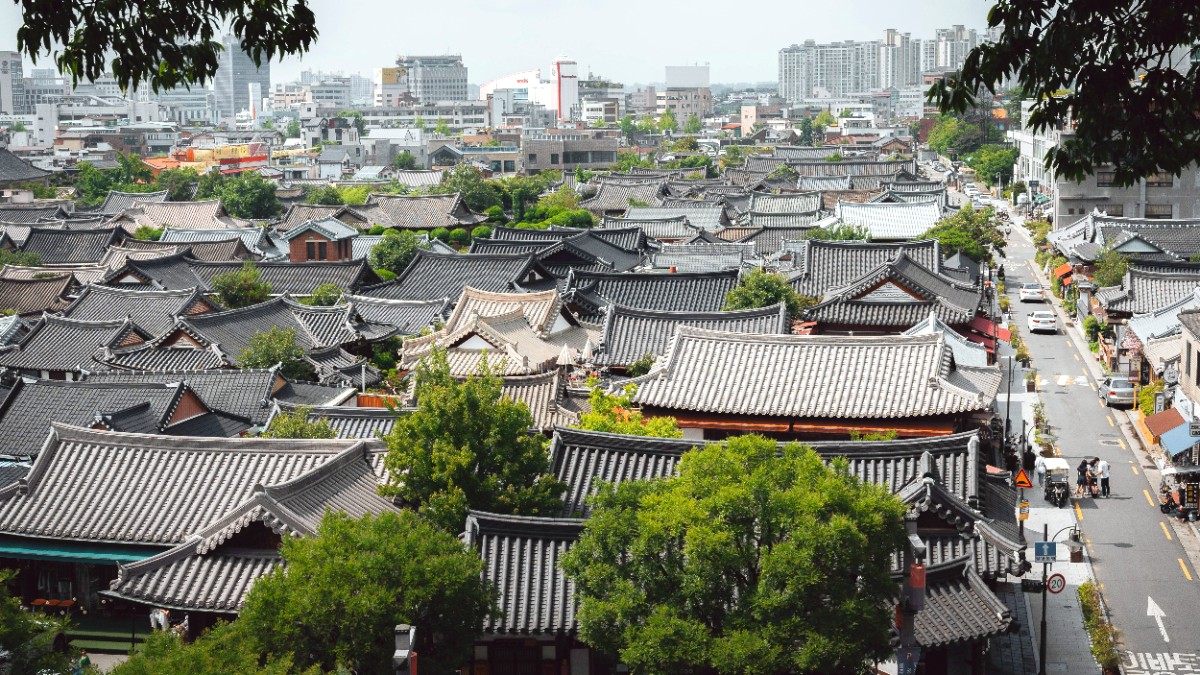
Jeollabuk Do, South Korea
Each season in Jeonju offers a distinct experience. This influences crowd levels, prices, and available activities.
Consider climate patterns throughout the year, including temperature, precipitation, and humidity.
Spring and autumn offer the most comfortable weather for extensive walking tours of the Hanok Village, with mild temperatures and clear skies.
Many of Jeonju's food festivals, including the famous Jeonju Bibimbap Festival, occur in spring and autumn.
April-May, October-November
Ideal weather for activities, festivals, spectacular natural scenery.
Higher accommodation/flight prices, larger crowds at attractions.
Early March, late November, early December
Fewer crowds, potentially lower prices, still enjoyable weather.
Unpredictable weather, some smaller attractions may have limited hours.
Summer (Monsoon), Winter
Significantly fewer tourists, lower prices for flights and lodging.
Hot, humid, heavy rain in summer; very cold, icy in winter.
The summer monsoon (jangma) is a weather consideration. Heavy rainfall during this period can lead to localized flooding. While direct typhoons are more common along the coast, their remnants can bring strong winds and heavy rain inland to Jeonju.
Winter brings icy conditions, making some paths in the Hanok Village slippery. Air pollution, or miseu meonji (fine dust), can be a concern, especially in spring. Checking air quality apps and using a KF94 mask on high pollution days is a good practice.
For capturing blossoms.
For rich, colorful foliage.
Clear mornings after snowfall offer unique picturesque scenes.
Beautiful year-round, but especially comfortable in mild seasons.
Spring and autumn are best for outdoor excursions.
Entry rules can change, so always check official sources before your trip. South Korea offers visa-free entry for short stays to citizens of many countries.
Many nationalities, including citizens from the United States, Canada, Australia, and most European Union member states, qualify for visa-free entry, typically allowing stays of 30 to 90 days for tourism. A full list and durations are on the official Hi-Korea website.
Regardless of visa needs, several documents are part of the entry procedure. Your passport must be valid for at least six months beyond your intended stay.
South Korea uses the Won (KRW). Its value and common expenses help you estimate your budget. Major credit cards are widely accepted.
These daily cost estimates exclude international flights and assume a single traveler.
Budget Traveler: ₩50,000 - ₩80,000 (~$38 - $60 USD) daily. Focus on guesthouses or hostels (from ₩30,000), street food and local eateries (₩3,000-₩15,000), and efficient public bus use (₩1,500).
Activities mainly involve free attractions like the Hanok Village, Jeonju National Museum, and Jeonju Hanji Museum. Gyeonggijeon Shrine costs ₩3,000.
Ranges from budget hostels to luxury Hanok stays, depending on your choice.
Hostel/Guesthouse bed: ₩20,000 - ₩40,000
Luxury hotel/Premium Hanok stay: ₩120,000 - ₩300,000+
Jeonju is a culinary city, offering options from street food to fine dining.
Street food/Small snack: ₩3,000 - ₩8,000
Fine dining/Upscale Hanjeongsik: ₩40,000+
Navigate the city and beyond using buses, taxis, or high-speed rail.
City bus fare: ₩1,500 (cash) or ₩1,450 (T-Money card)
KTX from Seoul (Yongsan) to Jeonju: ~₩35,000 - ₩40,000
| Attraction | Type | Cost |
|---|---|---|
| Jeonju Hanok Village | Outdoor Exploration | Free |
| Gyeonggijeon Shrine | Historical Site | Adults ₩3,000 |
| Jeonju National Museum | Museum | Free |
Jeonju presents a safe environment, but local conditions and common concerns warrant attention for managing any situation.
No specific vaccinations are mandatory for South Korea entry for most travelers. Routine vaccinations are always advisable. Consult a healthcare professional.
Air pollution (miseu meonji) can be an issue. Check forecasts and consider wearing a KF94 mask on high pollution days.
Foodborne illness is rare due to high hygiene standards. Tap water is generally safe. Choose clean, busy restaurants.
Emergency Services: Dial 119 for Fire/Ambulance, 112 for Police.
South Korea has a high-quality healthcare system. Hospitals and clinics in Jeonju offer modern medical care, with emergency rooms open 24/7. Larger hospitals often have international patient services.
Stay hydrated in summer heat. Use Insect repellent in warmer months, especially near green areas.
LifeStraw provides Water filtration products, useful for added water safety.
Jeonju is a very safe city, with low crime rates. Violent crime against tourists is rare.
Practice standard precautions against petty theft: watch your belongings in crowded areas.
The Jeonju Hanok Village area is well-lit and generally safe, even at night.
Jeonju, while inland, can see effects from coastal typhoons in summer/early autumn, bringing heavy rain and strong winds. Minor tremors from earthquakes can occur, but significant damage is rare. Heavy rainfall during monsoon season causes localized urban flooding, which usually clears quickly.
A comprehensive travel insurance policy is advisable for all travelers, offering protection from unforeseen circumstances. This policy generally covers medical emergencies, trip cancellation, and lost baggage.
World Nomads for adventurous travelers, SafetyWing for digital nomads, Insubuy for US visitors.
Tourist Information (Jeonju): +82-63-282-1330. Korea Travel Hotline: 1330 (24/7, multi-language). Your country's embassy/consulate.
Consider Pacsafe for anti-theft bags. Adventure Medical Kits for first aid supplies.